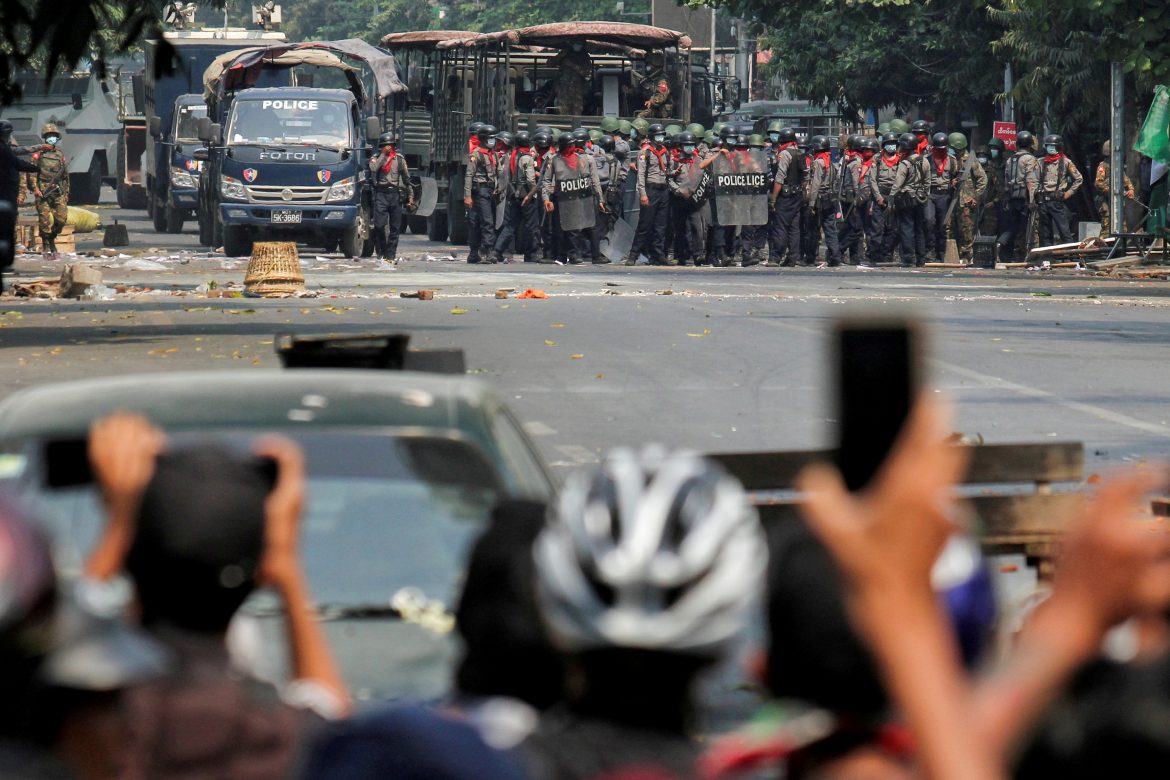It was February 28. Columns of soldiers were approaching the village along its main roads to the north and west. There was only one way out – a dirt path to the east with a small bridge over the Yama stream. The bridge could only take motorbikes, no cars or bullock carts.
“There were about 1,000 of us. And only one exit for everyone,” said Kyaw Hsan Oo, a resident of Kone Ywar. “It was terrifying, difficult and chaotic.”
Shortly after the soldiers marched into Kone Ywar, the residents of the farming village watched in despair from afar as huge clouds of smoke began billowing up across their paddy farms, in the direction of their homes.
Kyaw Hsan Oo, a 30-year-old utility worker, said he returned to Kone Ywar the next day to find most of the village of about 600 households razed to the ground. The wooden and brick homes of some 386 families were destroyed, along with all of their belongings – clothes, furniture, pots and pans – leaving them homeless, with just the clothes on their backs.
Worse, returning villagers found the bodies of two 50-year-old men who had been unable to flee because of poor health. They had been shot.
The charred body of a third man was found in the ruins of his home.
“Those villagers were innocent,” said Kyaw Hsan Oo. “They are not part of the resistance, just simple villagers. This is brutal and inhumane.”
Kone Ywar was targeted, according to Kyaw Hsan Oo, because of its support for Myanmar’s jailed elected leader Aung San Suu Kyi, whose government was toppled in a coup in February 2021. The military, led by Senior General Min Aung Hlaing, justified the power grab with unsubstantiated claims of fraud in elections the previous November which had returned Aung San Suu Kyi and her National League for Democracy (NLD) to power in a landslide.
The coup triggered mass protests across the country, including in Kone Ywar, where residents took to the streets in near-daily shows of defiance. The military cracked down with brutal force, shooting and killing unarmed protesters in cities and towns across the country, including in the biggest cities of Yangon and Mandalay. Despairing of securing change by peaceful means, the people of Myanmar have since taken up arms against the military in what a shadow administration set up by deposed legislators, the National Unity Government (NUG), has called a people’s uprising.
More than two years since the power grab, violence has engulfed vast swathes of the Southeast Asian country of 53 million people. The United Nations estimates the military has killed at least 2,940 civilians and detained more than 17,000 people, creating a “catastrophic” situation for human rights in Myanmar. The military’s indiscriminate use of air raids, artillery shelling and clashes with groups opposed to its rule – including ethnic armed groups and civilian militias known as the People’s Defence Forces (PDFs) – has displaced more than 1.5 million people nationwide and left some 17.6 million in need of humanitarian assistance.
Nowhere has the violence been as intense as in the Sagaing region of central Myanmar, where Kone Ywar is located and where reports indicate near-daily confrontations between resistance forces and soldiers, air attacks, bombings and torching of homes. The UN said it has documented at least 1,200 killings in Sagaing alone, and the razing of tens of thousands of homes – actions that it said may amount to war crimes.
The military has restricted access to Sagaing and imposes communications blackouts on an ad hoc basis, hampering journalists from reporting on the escalating conflict in the region.
Satellite images obtained by Al Jazeera’s Sanad Investigative Unit, however, reveal widespread destruction in the area, with some villages nearly completely or partially turned to ashes. Survivors from several villages told Al Jazeera by telephone that soldiers killed anyone who was too old or infirm to flee, stole valuables from their homes, destroyed documents such as identity papers and set fire to buildings and food supplies. The torchings have left hundreds of thousands of people in Sagaing in need of urgent food aid and shelter, according to the UN and local charity groups.
“They target all the villages that are not accepting them or resisting them,” said Kyaw Hsan Oo. “They burn any village that does not agree with them. And kill anyone who does not listen or obey them.”
The military, which calls itself the State Administration Council (SAC), did not respond to repeated calls and emails from Al Jazeera seeking comment.
Read more here.

